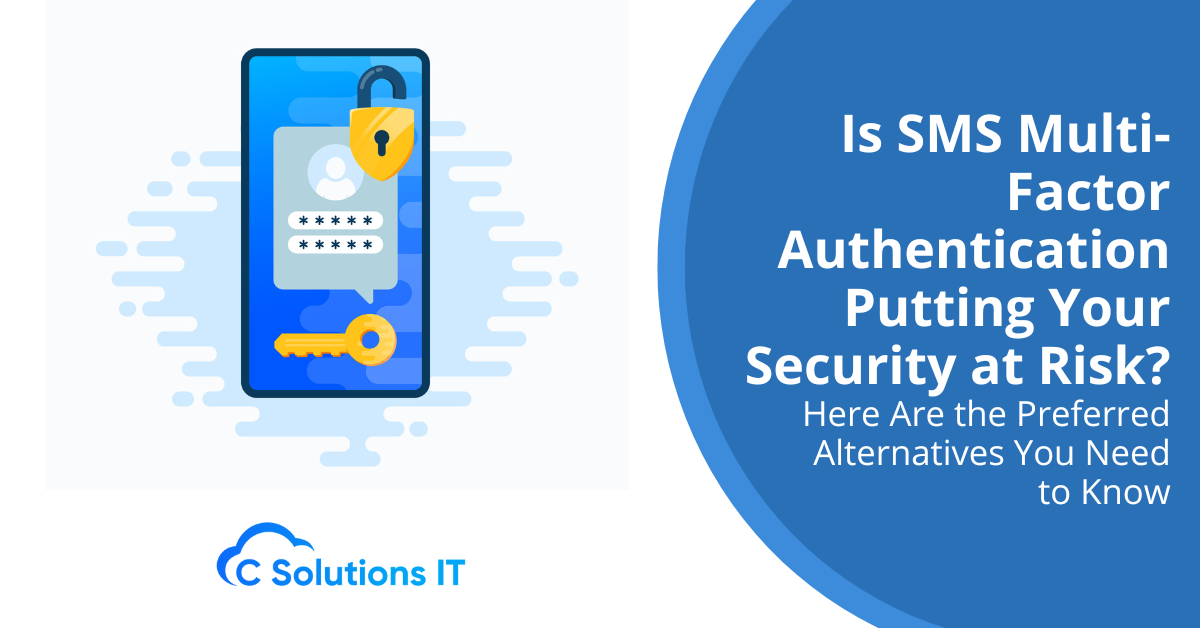Is SMS Multi-Factor Authentication Putting Your Security at Risk? Here Are the Preferred Alternatives You Need to Know

Cybersecurity is a major concern for businesses and individuals alike. To protect our online accounts, many of us have turned to multi-factor authentication (MFA) to add an extra layer of security. One popular form of MFA is SMS authentication, where a one-time code is sent to the user’s mobile phone.
While SMS MFA may seem like a simple and convenient option, it does have some risks that are worth considering. In this article, we will explore the challenges that come with SMS MFA and suggest some preferred alternatives.
What are the Risks of SMS Multi-Factor Authentication?
SMS Authentication Vulnerabilities
SMS authentication is vulnerable to several types of attacks, such as phishing, SIM-swapping, and interception. For example, a hacker could send a phishing message to the victim’s phone, tricking them into giving away their login credentials or MFA code.
Alternatively, a hacker could hijack the victim’s phone number by stealing their SIM card, allowing them to receive the victim’s SMS codes. It’s also possible for hackers to intercept the SMS code using a variety of methods, such as man-in-the-middle attacks or by exploiting vulnerabilities in the mobile network.
Lack of Security Standards
Another issue with SMS authentication is the lack of security standards. SMS messages are not encrypted, and there is no way to verify the sender’s identity.
This means that an attacker could send a fake SMS message that appears to be from the user’s bank or other trusted organization, prompting the user to enter their login credentials or MFA code. This type of attack is known as a smishing attack.
Limited Protection
While SMS authentication does provide an additional layer of security, it is not foolproof. Hackers have developed sophisticated methods of bypassing SMS MFA, such as social engineering attacks that trick the user into providing their login credentials or MFA code.
Passwordless Authentication: Preferred Alternatives to SMS MFA
Social engineering attacks, phishing, and data breaches have become commonplace, with hackers using increasingly sophisticated methods to steal sensitive information. In this age of digital transformation, the need for robust online security measures is more critical than ever.
Fortunately, there are alternatives to SMS authentication that offer better security and convenience. The most promising alternative is passwordless authentication.
Passwordless authentication eliminates the need for passwords, which are vulnerable to hacking and phishing attacks. Instead, it uses a combination of biometric data and other authentication factors, such as authenticator apps, to verify the user’s identity.
Passwordless authentication is more secure than SMS authentication because it leaves SMS-based attacks, like SIM swapping and phishing, out of the equation. Here are some of the best alternatives to SMS MFA that you can use to secure your online accounts:
Authenticator Apps
One preferred alternative to SMS MFA is the use of authenticator apps, such as Google Authenticator or Microsoft Authenticator or our favorite Authy. These apps generate a one-time code that can be used to authenticate the user, without the need for an SMS message.
Authenticator apps are more secure than SMS authentication because they are not vulnerable to SIM-swapping or interception attacks. These apps can also be used even when the user does not have a mobile network connection, which is not possible with SMS authentication.
Hardware Tokens
Another alternative to SMS MFA is the use of hardware tokens, such as YubiKey or RSA SecurID. Hardware tokens are physical devices that generate a one-time code when pressed or inserted into a computer.
Hardware tokens are more secure than SMS authentication because they require a physical device in hand, which keeps them safe from interception, SIM-swapping, and similar attacks. Since hardware tokens do not require a mobile network connection or an app, they can be more convenient to use in many scenarios.
Biometric Authentication
Last but not least, another preferred alternative to SMS MFA is biometric authentication, such as fingerprint or facial recognition. Biometric authentication is more secure than SMS authentication because it is difficult to fake or steal someone’s biometric data.
Biometric authentication is also more convenient than SMS authentication and many of its alternatives because it does not require the user to enter a code or use a separate device.
Secure Your Accounts Today
While SMS authentication may seem like a convenient option for multi-factor authentication, it comes with several risks, such as vulnerability to phishing, SIM-swapping, and interception attacks. There are no security standards for SMS authentication, which makes it easy for attackers to exploit.
As such, it’s recommended that users use preferred alternatives, such as authenticator apps, hardware tokens, or biometric authentication. By adopting these alternatives, users can better protect their online accounts and personal information.
If you need help securing your online accounts or implementing multi-factor authentication, contact C Solutions IT today. We can help you identify the best MFA solution for your specific needs and guide you through the setup process.
